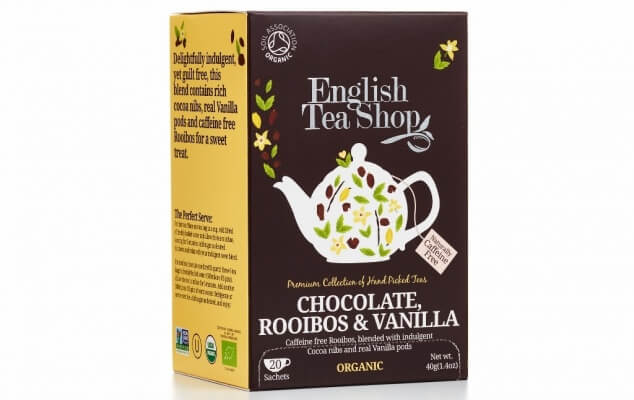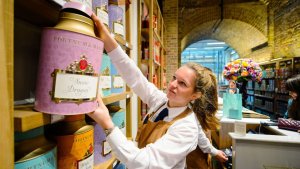Booming Business With A Conscience
How English Tea Shop is riding a wave of demand for high-quality, organic food and drink.

Organic is a £2 billion global industry. Suranga Herath, CEO of English Tea Shop, is tapping into the growing interest in high-quality, ethically-sourced produce to grow his £22 million turnover business by 25% this year.
Introduce us to your business
English Tea Shop is an independent speciality tea company, headquartered in the UK, with retail and wholesale customers in 50 countries worldwide. Specialising in organic and premium-quality teas, we produce a range of over 130 varieties of teas and tisanes at its own factory in Sri Lanka.
English Tea Shop is a fast-growing business and a pioneer of sustainable practices, putting its employees and suppliers’ livelihoods first using the principles of value sharing.
It was founded in 2010 and is now a leading global specialist tea company. Our range has recently become 100% organic and is produced in our factory in Sri Lanka.
We’ve had instant success due to our attractive and unique packaging, superior teas and tisanes and unparalleled range and service including such distinctive flavours as ‘Chocolate Rooibos and Vanilla’. We are also a pioneer of sustainable practices which allows us to craft a premium product respecting all members of our supply chain.
What was the motivation for starting up?
The founders of English Tea Shop have a strong history in tea. However we wanted to set ourselves on a uniquely different path to what we’ve been doing with tea all our lives. The tea market has always been a booming one, but there was still a gap for a premium, lifestyle product which had organic farming at its very foundation.
How has the business developed?
Having only launched in 2010, we have grown very successfully with retail and wholesale customers in 50 countries worldwide. After turning over £22m for the Group (£8m of which came from the UK), we are now in a strong position to target a minimum of 25% growth in 2017.
We also have a clear global expansion plan and aim to be in 80 markets by 2021 which makes this a very exciting time for the business.
In line with this, our customer base has evolved showing our ability to keep up with trends in the market. Not only are we selling to the likes of Harrods and Selfridges but we are also tapping into an increasingly health conscious consumer base which is looking at provenance more than ever.
Is the tea market booming right now?
Worth almost £2bn in 2015, the organic market has created more opportunities for small and medium enterprises than ever before[1]. Whilst one end of the market is dominated by mass scale producers and multiple retailers, the mid-to-premium segments are a haven for people who have great passion for high quality and healthy food & drinks.
The core of our story is of course the small farmer who lovingly grows our organic teas and ingredients and our 400 employees who process the products.
With our strong ties to the organic market and with our sustainable practices forming the foundations of our company, we have a clear and achievable ambition of being the best organic tea brand in the world.
What risks do you face in this market?
Even with our skilled people, good machinery and general business acumen, we still faced a number of unknowns. Building a unique platform by linking the organic farms right through to the market was one of them.
Hence, seven years down the line, we have a global business covering almost the entire value chain, from small farmer-gates, right through to organic retail and food service channels.
What is your marketing channel of choice?
The first exhibition of our re-branded range at Biofach in February 2012 (Nurnberg, Germany) very much acted as a platform to others. Our calendars are now full with about 20-25 exhibitions a year meaning we can study trends and build relationships with many markets.
It’s conferences such as these which make English Tea Shop one of the world’s leading global specialist tea companies.
What is the most difficult aspect of your business?
An often-tricky balancing act has to take place between delivering great value to our customers, while looking after our supplier base. Even though this is challenging, the fact that we are looking after all facets of our supply chain is extremely fulfilling.
The ‘Love, Care and Change’ policy embedded throughout our organisation helps us to do this. For example, we are committed to paying our organic farmers higher than the Fairtrade minimum price and several times higher than that.
What would you change about the business environment today?
Whilst Brexit is leading many businesses along an uncertain path, we remain optimistic about the future and the ability of the UK government to go into the forthcoming negotiations with an open and mature mindset. An agreement which advances cross border trade and has the best interests of consumers and businesses in mind is key.
What is your biggest mistake?
There’s no denying that the business world has changed dramatically, with social media now playing more of a role than ever before in the marketing and sale of products. Our mission now is to ride this digital wave, which we were admittedly late in doing.
This will enable us to communicate our story to new markets so we not only stay on top of trends in the organic sector but also in the overall business climate.
How do you rate government support for growing businesses and why?
The UK government, through the UKTI, has helped us during the initial phase of the business to build export markets.
In a very competitive global market, it’s important for the government to drive home the value of growing organic exports. Organic has set itself apart as a market of opportunity and to further open these opportunities up we would love to be able to market our products in China and South Korea with the help of the government.
What are your top three tips for people starting a business?
It’s important to identify what your business’s USP is from quite early on. Having a clear focus on this can help to maximise growth and channel resources efficiently.
Number two is to ensure that all parts of the supply chain are respected. In our case, this extends to our farmers, buyers and end consumers. At English Tea Shop, we put the livelihoods of members of our supply chain above the principles of value sharing, driving better products and a more sustainable environment
Number three is to treat your customers in the way you want to be treated. Be it trade customers or consumers; we note their concerns to build up a brand that not only makes great organic tea, but truly cares as well.
[1]The Guardian 2017
Thanks for signing up to Minutehack alerts.
Brilliant editorials heading your way soon.
Okay, Thanks!



